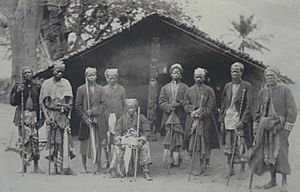Herzekiah Andrew Shanu facts for kids
Quick facts for kids
Herzekiah Andrew Shanu
|
|
|---|---|

The Nine Kings of Boma, Congo Free State, c. 1890, halftone. A photograph by Shanu published in Le Congo illustré 1/19 (1892), 149.
|
|
| Born | 1858 |
| Died | 1905 Boma, Congo Free State
|
| Known for | Photography |
Herzekiah Andrew Shanu (born 1858 – died July 1905) was a talented photographer. He is remembered for his important role in speaking out against the unfair treatment of people in the Congo Free State.
Early Life and Career
Herzekiah Andrew Shanu was born in 1858 in Lagos, which is now part of Nigeria. He was a member of the Yoruba people. He first became a teacher after studying at the Church Missionary Society Grammar School. He also attended a special Training Institute for Teachers. For several years, he taught at a primary school in Lagos.
In 1884, Shanu started working for the government of the Congo Free State. He began as a clerk and later became a sub-commissioner for a district. He also worked as a translator, helping to translate between French and English in the governor-general's office in Boma.
Shanu settled in Boma, which was the capital city at the time. There, he opened his own general store and a photographic studio. His photographs were even published in a magazine called Le Congo illustré. In 1894, he traveled to Antwerp to visit a big international exhibition. He showed his loyalty to the Congo Free State in 1900 by supporting the authorities during a rebellion by the local army.
Fighting for Fairness
Herzekiah Shanu became a brave activist. In 1903, he shared important information with Roger Casement about the bad treatment of workers from West Africa in the Congo. Casement then connected Shanu with E. D. Morel, another person who was trying to expose the problems in the Congo.
Shanu and Morel exchanged messages for several years. Shanu sent Morel many important documents. These included records from trials against lower-ranking officials in the Congo Free State. These documents showed how badly people were being treated.
While trying to get more information from the police chief in Boma, Shanu's actions were discovered. As a result, government officials began to bother him. After it became known that Shanu had given evidence of unfair treatment to the Congo Reform Association, government workers were told to boycott his businesses. This meant they were told not to buy anything from his store or use his photography studio.
 | Frances Mary Albrier |
 | Whitney Young |
 | Muhammad Ali |

